One of the many interesting threads started on the forum last month was Bob Hornegold asking what would be the one barbel fishing tip above all others that you would pass on to increase your chances of catching. If you have not yet had a chance to read it through then it may be an idea to check it out HERE before you read on…

Oh – and if you are a member of the ‘Barbel Police’ best you rev up your engine and switch on the noisy sirens and pretty flashing lights now…
There is plenty of good stuff there, most of which will certainly help you to put a few more barbel on the bank, but there are several key tips missing…and, it has to be said, an awful lot of bollocks as well.
In respect of the ‘missing’ tips it could be that some of them are so obvious that nobody deemed it worth mentioning them, or, it could be that the more clued up anglers are keeping their cards close to their chests – and as someone who has done more than their fair share of that over the years to protect a hard-earned edge or two I’ll not knock it!
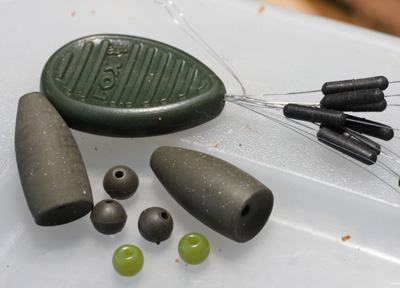 My one tip leaving aside Barbelboi’s ‘Shhhhhhh’ – which is so important it over-rides everything else – is ‘use a back lead’ and I’m amazed at how few river anglers actually employ one.
My one tip leaving aside Barbelboi’s ‘Shhhhhhh’ – which is so important it over-rides everything else – is ‘use a back lead’ and I’m amazed at how few river anglers actually employ one.
I appreciate their use is not practical on all venues but on the vast majority of rivers and in the vast majority of conditions the use of a back lead will increase your chances of catching a barbel tenfold; on a pressured, small river where the barbel are hard fished for perhaps more than that.
Line management is fundamental to ensuring you don’t spook fish so if you have done as Barbelboi suggests and made a stealthy approach then why the hell do you then advertise your presence to every fish in the area by having a tight line running through the swim to your end rig?
Bow string tight lines used to be de rigeur in carp fishing back in the 80’s but check out most carp waters these days and if it is populated by carp anglers with half a clue more often than not you will see slack lines, fluorocarbon and leadcore leaders, backleads and bobbins on the deck. Despite the fact they are carp anglers these guys are not stupid and although I take the Mickey out of carp and carp anglers mercilessly there is no doubt they are at the cutting edge of tackle technology and tactics in so many respects. Specialist anglers who ignore what they are doing are missing out big style.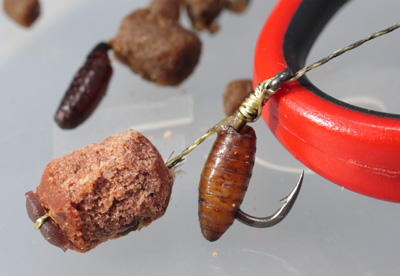
Sure there are times for rods high on the rivers – when you need to keep line out of the water in a flood, when you are fishing over structure in the margins for example – but quite why almost every barbel angler I’ve walked past in the past couple of months has had their rods high and tight lines is a total mystery to me. Unless you are actively rolling a lump of meat if you want to catch fish consistently you should be using fluorocarbon main line, a long leadcore leader, a flying backlead and be fishing with your rod tips low to the water and, unless you are upstreaming, with a slack line too.
Yes, tips low and a slack line!
You do not need to look at your tip for taps and plucks and gentle trembles. A barbel has what Gary Knowles once brilliantly described as ‘an anti-eject mouth’ – once your hook goes in there is no way it is going to spit it out and whether you are fishing tight or slack if your hook is sharp and your rig reliable it’s game over. Simples!
Ever get sailaway pulls you can’t connect with when you are barbel fishing? Sorry, but it wasn’t a missed bite it was a barbel spooking off your patch and hooking your line on a fin as it did so. Ever get trembles and twitches and get excited because these line bites mean there are fish in the swim? Get less excited, you know they are there but you’ve got it wrong and they know you are there too!
OK, so what about the bollocks?
Geoff Maynard – good friend, lovely man, fellow hippie – bad advice! Well, not actually bad but not strictly true.
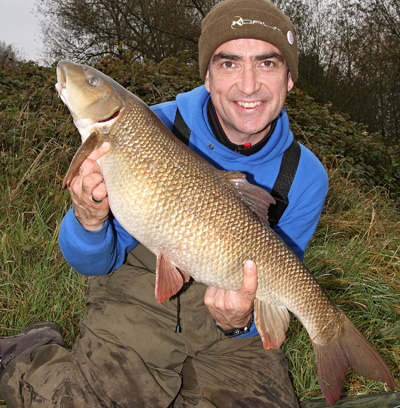
Geoff’s main tip is to stay until after dark. Just last week he and I fished the same section of River Kennet; I arrived early and fished the morning and afternoon, leaving well before dusk. Geoff arrived late and fished well into darkness.
Result – a hatful of barbel to yours truly and not a bite to Geoff! OK so one session doesn’t mean anything at all but the truth of the matter is that you do NOT have to fish after dark to catch barbel – they are just as catchable during the day.
The only reason most barbel anglers only catch at dusk or after dark is because they are just not good enough to catch them during the day!
Before I get lynched I ought to say on very many occasions I’ve not been good enough either and have only picked up a fish at dusk onwards after being on the river for hours but those fish were almost certainly there and catchable all day long if only I had got it right.
Barbel, like most fish, lose a lot of their natural caution as the light fades – it’s genetic as much as anything – as the threat from predators is lessened they feel more comfortable foraging. They become more active, move from holding areas and have less visual input from their eyes so are less likely to see leads, hooks, obvious baits…
If you are under the impression you have to fish at night then look at the likes of top barbel angler Pete Reading – he’s been known to catch a barbel or two and yet hasn’t, to my knowledge, fished after dusk for the last 20 years or so! These days I’m pretty much the same and although I do occasionally stay on after dark – especially in winter when the nights are so long – I am far happier fishing daytime sessions and I’ve been known to catch the odd one too!
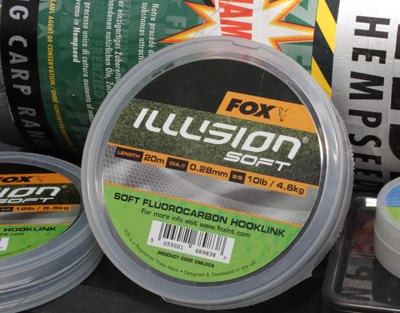 Don’t get me wrong, I’ve no objection whatsoever to people fishing through the night for barbel. Put up a bivvy, put your rods on buzzers and get stuck in by all means; I just choose to try and fish well and catch them on my terms rather than wait until a time when anyone can catch them.
Don’t get me wrong, I’ve no objection whatsoever to people fishing through the night for barbel. Put up a bivvy, put your rods on buzzers and get stuck in by all means; I just choose to try and fish well and catch them on my terms rather than wait until a time when anyone can catch them.
Over the years I’ve found the most prolific time for catching barbel is between 11.30 to 13.30 so why on earth would I want to be on the river through the night when I can have caught them by lunch and be back at home to spend the hours of darkness with a glass of wine, a good meal, a warm bed and a hot woman?
Catching daytime barbel is down to a number of factors; the line management I referred to earlier is one piece of the jigsaw and Barbelboi’s ‘Shhhhh!’ is another. The simple act of walking into a swim and pushing a bankstick in is enough to alert any barbel in a swim to your presence – even worse if you are ‘screwing’ a bankstick into gravel! It can take hours of quiet baiting and waiting just to overcome the fear you have caused in a barbel by your arrival – then you might decide to cast out every few minutes….Every cast is potentially a liability, you really must enter stealth mode as soon as you approach within a few metres of the bank. In fact on the small, pressured venues you shouldn’t really be casting at all you should be using a cupping kit on a long pole and lowering your hookbait into position without so much as a ‘plop’.
You must think very carefully about your tackle too: line diameter and visibility is vital, camoflaged hooks and leads are vital, hook and bait size is vital – anyone who fishes for a daytime summer barbel with anything other than maggot or caster or a pea-sized bait (a petit pois at that) on a size 10 (max) is asking for a blank (I excuse the Trent and Severn lads in barge-churned, tidal, murky waters with the odd dead cow floating downstream).
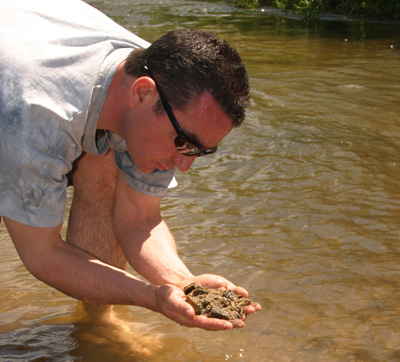 Back in the day I used to collect sand gravel from the swims I fished regularly, dry it out in the oven and glue it to my leads so I wasn’t just fishing a camo lead but a lead wearing an overcoat of EXACTLY the same substrate I was fishing over. These days lead coating has come on somewhat and I’m not quite so anal but believe me it makes a real difference.
Back in the day I used to collect sand gravel from the swims I fished regularly, dry it out in the oven and glue it to my leads so I wasn’t just fishing a camo lead but a lead wearing an overcoat of EXACTLY the same substrate I was fishing over. These days lead coating has come on somewhat and I’m not quite so anal but believe me it makes a real difference.
Take time out and spend a few hours on a clear stream on a bright day with your tackle and bait, some waders and a pair of Polaroids and just look at your presentation underwater: try different hooklengths, different leads, different baits, see how groundbait behaves, see how far downstream particles come to rest.
If you are a thinking angler it could well be the most important couple of hours you ever spend on the river.
Moving on, the worst piece of nonsense posted on the thread was that – and I cringe to even type it – ‘barbel are more intelligent than we think.’
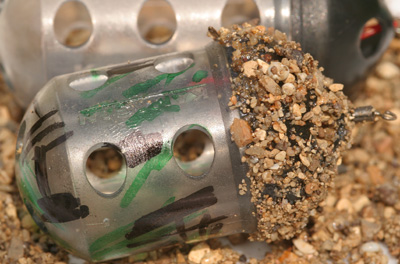
Oh dear, oh dear oh dear… I’m sorry, but no – they are as thick as….well, you know!
Barbel are, without doubt, the easiest of all big fish to catch simply because they are so stupid and predictable. Big chub – very tricky indeed, huge bream – almost impossible at times, monster roach – you need to be at your very best, big perch – not difficult but can be tricky, big tench – finicky and so on and so on but big barbel – they are child’s play!
Barbel are a lot like sheep, get them grazing and they will carry on grazing and the more they graze the more they want to graze and they will follow one another round foraging non-stop to such an extent that by clever strategic baiting you can get them to move literally hundreds of metres – you can make them go and do exactly what you want, when you want and – best of all – once they have picked up your bait they are caught! There is no delicate chub-like lip sampling and pecking with Mr Barbus – he sucks it in and it’s in until your forceps pop it out!
 We condition fish to be more difficult to catch than they should be but it is a mistake to confuse that with intelligence, it is simple instinct for survival and is genetically programmed. A barbel, like all wild animals, has only three basic requirements in life: to eat, to avoid being eaten and to breed. We (usually) don’t fish for barbel when they are having sex so that is out of the equation but we can make them eat and we can make them confident of not being threatened by the way we fish and a confident barbel having a feed is as good as in the net.
We condition fish to be more difficult to catch than they should be but it is a mistake to confuse that with intelligence, it is simple instinct for survival and is genetically programmed. A barbel, like all wild animals, has only three basic requirements in life: to eat, to avoid being eaten and to breed. We (usually) don’t fish for barbel when they are having sex so that is out of the equation but we can make them eat and we can make them confident of not being threatened by the way we fish and a confident barbel having a feed is as good as in the net.
I will finish off by adding a couple of final tips to the ‘thread’. I’ve kept these close to my chest for the past decade or so and I claim the credit for neither of them but am grateful to Messrs. Martin Bowler and Fred Wilton for passing them onto me because they have caught me literally hundreds of big barbel over the years. Nothing revolutionary, some of you will be there already but I suspect some of you won’t!
Fish the straights between bends and ignore the margins for the biggest barbel and get on high quality milk proteins in winter.













